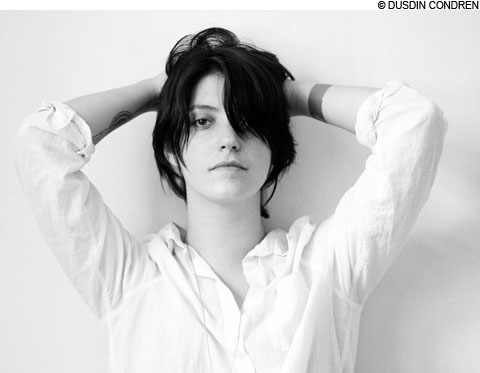
EMOTIONAL WEIGHT "It's kind of a '90s mentality to talk about how you feel," says Sharon Van Etten. "I'm a little outdated, but I love it." |
Sharon Van Etten is peeling an orange in her South Brooklyn apartment. After 14 months on the road, she's unpacked her bags in a place she can, for now, call home. During the vocalist's transitory period — following the release of her 2009 debut Because I Was in Love and 2010 follow-up Epic — the Jersey-born 30-year-old's only constant was the Brooklyn garage studio of the National's Aaron Dessner. That was where she recorded Tramp — her third full-length and debut on Jagjaguwar — an album penned between nights spent crashing with friends and months subletting random apartments.Tramp is something of a celebration. Van Etten's previous two records dealt with the aftermath of a scarring relationship: in her music and interviews, she mentions a boyfriend she dated for five years while living in Tennessee — someone who downplayed her art and discouraged her from pursuing music. "The main difference with this record is that instead of singing about it, it's more about how I've gotten through it," says Van Etten by phone. "I have a lot of perspective on it." The LP features appearances by members of the Walkmen, Doveman, Beirut, and Wye Oak, plus ethereal vox by fellow Brooklynite Julianna Barwick.
Abetted by her arrestingly smoky voice, her songs range from strummy confessionals to vast, atmospheric soundscapes. But each of Van Etten's songs bring her personal life into the spotlight. She admits it's not the hippest approach to songwriting at the moment. "I'm a little outdated, but I love it," she says. "It's kind of a '90s mentality to talk about how you feel." On Tramp, she does just that: pain, desire, anger, growth, and emotional recovery are all themes. It's all reminiscent of the grungy, introspective songwriting favored by female singers in the mid-'90s, and Van Etten is oft-compared to PJ Harvey, Liz Phair, Cat Power, and the like.
But unlike those artists, Van Etten's artful use of space is unmatched: the LP ebbs and flows with slow crescendos of her defiant soprano, which on Tramp is more confident than ever. Van Etten's expansive sonics are cohesive, a consistent mood she says was inspired by the production methods of John Cale, the Velvet Underground's avant-garde energy source. In fact, the high-contrast black-and-white self-portrait cover of Tramp is a direct homage (read: almost identical) tothe cover of Cale's 1975 LP, Fear.
On standout "I Am Wrong," she carries a vocal melody over a haunting, sparse drone. Guitar feedback, keys, bass, glock, drums, EBow guitar, and trombone flesh out the space as Van Etten sings, "It's bad/It's bad/It's bad to believe in any song you sing." It's a meditation on that one big oppressive relationship that discouraged her from singing, now that she's hugely confident.
"It's kind of tongue-in-cheek about someone not being supportive of you," she says. As tension builds, one droning note plays, and the lyrics stand up for themselves, triumphant: "Tell me I'm wrong/Please tell me I'm wrong/Tell me I'm wrong," she chants. "It's not really a sad song," says Van Etten. "It's just super dry." Such is Tramp.